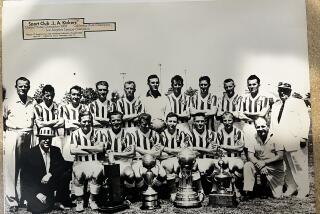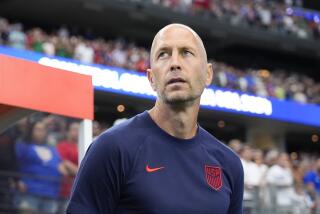WORLD CUP USA ’94 / MEMORIES : BILL PLASCHKE : Most Important Lesson Was Here the Whole Time
- Share via
The television image-makers will tell you the World Cup was about rock stars and gods.
The Century City suits will tell you it was about economic impact.
The soccer nerds--and won’t they be coming out of the upholstery--will tell you it was about a future professional league.
But, as usually happens when people forget about other people, they will all be wrong.
The World Cup was about cabbies.
It was about climbing into the back seat of a ripe taxi, glancing up at the foreigner sitting on a strange bed of wooden beads behind the wheel, then doing something for the first time in your adult life.
It was about talking to the guy.
It was about asking where he was from.
Then, of course, it was about asking about his country’s soccer team.
We could have asked this before. But, sadly, never before have we cared.
For one month, the World Cup offered our diverse nation a chance to sit at a common table. Those of us lucky enough to accept that invitation looked across that table with surprise.
Immigrants who are the recipients of our anger and butts of our jokes, those with funny accents who pass through our lives as blurs behind a mini-market counter or in a strawberry field or in the front seat of a cab . . . they became more than just images.
They became people. People with voices and homes and dreams.
Before the World Cup, we considered them aliens.
After spending a month using the universal language of soccer, we have discovered they are neighbors.
Forget this notion about a sporting event bringing the world together. The World Cup taught us about the bridges that can be built within our own borders.
Our differences, often the reason for disdain, suddenly became cause for celebration.
There was the cabby from El Salvador who was still furious at a perceived slight to his team during qualifying.
Yes, I said, I now understood about the power of soccer referees, and wasn’t that too bad.
By the way, he added, he came to this country several years ago, lives in a small apartment outside New York City, and hopes one day to save enough money to bring the rest of his family.
Good luck, I said. And for once, I wasn’t just saying it.
Then there was the cabby from Sudan who wondered if the Nigerians had enough gumption to survive the second round.
When he wasn’t driving a cab, he was working toward obtaining a college business degree that he could use back home.
He didn’t particularly want to move to our country, but he didn’t know another way he could help give his own country a future.
You should be proud of yourself, I said. And for once, I wasn’t just saying it.
Suddenly, numbing rides usually marked by weird pipe music coming from a makeshift radio became lively 30-minute debates.
Money changed hands, but so did smiles. The temptation was to hang up a sign so the next passenger would understand:
The World Cup was here.
Frighteningly, perhaps, this soccer tournament also changed the way we looked at people we thought we knew so well.
Like Patricia, an “aunt” to our children, the first person we invite to holiday celebrations, a former employee and dear friend.
She moved here from Colombia nearly 20 years ago, but until this summer had always resisted becoming a citizen.
When we asked why, she could never fully explain. She just shrugged when we told her we would never understand.
Then her national soccer team arrived in Southern California for the World Cup. And while watching it play on television from my assigned work stations on the East Coast, my eyes were opened.
Colombia was not just a bad joke about drugs, it was an actual country with real people possessing real passion. These thousands of Colombians, dancing and singing in the Rose Bowl stands, were far different from ones we usually see on the CNN clips of dirty Bogota streets and funeral processions.
I heard their chants, and recognized their anguish as their team fell behind, and my mind turned to Patricia.
Yes, I thought. So this is who she is.
Excitedly one morning, I picked up the phone in hopes of reaching her, of telling that I thought I understood why she was reluctant to become a citizen, that perhaps it was because she did not want to lose her heartfelt Columbian roots.
But she was not home. She had driven to the Rose Bowl with several other Colombian friends to watch the game against the United States.
And here, I didn’t even know she had Colombian friends.






